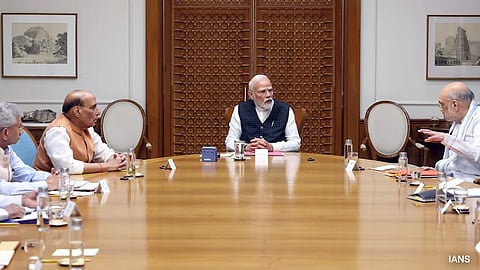

NEW DELHI: India on Wednesday announced a series of punitive measures against Pakistan.
These included suspension of the Indus Waters Treaty -- a water sharing agreement, closure of the Wagah-Attari border, cancellation of certain visas, and diplomatic expulsions, following the shooting in Pahalgam, a famed tourist destination in south Kashmir.
The attack, which took place in a remote meadow of Anantnag district on April 22, claimed 28 lives — 25 Indians, 2 Kashmiris and one Nepali citizen — and injured at least 17 others.
Prime Minister Narendra Modi cut short his Saudi Arabia visit and chaired a meeting of the Cabinet Committee on Security (CCS) on Wednesday evening.
The CCS, the apex decision-making body on strategic affairs, was briefed in detail about the assault.
Foreign Secretary Vikram Mistry said the meeting underscored cross-border linkages to the attack.
Experts say, the most decisive step has been suspending the Indus Water Treaty of 1960, a landmark agreement brokered by the World Bank between India and Pakistan that has withstood wars, skirmishes, and diplomatic standoffs.
The treaty regulated the sharing of six rivers — the Indus, Jhelum, Chenab, Ravi, Beas, and Sutlej — whose waters are crucial to agriculture, drinking water supply, and power generation in both countries, but particularly vital to Pakistan’s survival.
The CCS declared the treaty to be in “abeyance until Pakistan credibly and irreversibly abjures support for cross-border terrorism.”
Simultaneously, India also ordered the closure of the Attari Integrated Check Post, the only operational land crossing between the two countries.
Pakistani nationals already in India were told to exit the country no later than May 1, 2025.
Visas scrapped
The SAARC Visa Exemption Scheme (SVES), which allowed limited visa-free travel for selected citizens of South Asian nations including Pakistan, was also scrapped for Pakistani citizens.
All existing SVES visas held by Pakistanis were declared void. Those currently in India under the scheme were given 48 hours to leave.
Further, the government declared Pakistani military attachés — including defence, naval and air advisors — posted in New Delhi as persona non grata, instructing them to leave India within a week.
In a reciprocal move, India also announced it would withdraw its own military personnel from the Indian High Commission in Islamabad. The support staff of these service advisors will also be pulled out.
The CCS stated that these posts were now considered annulled.
In another blow to diplomatic engagement, India announced that the total strength of the Pakistani High Commission in New Delhi would be reduced from 55 to 30 personnel, with similar reductions expected at the Indian mission in Islamabad.
The downsizing is to take effect by May 1.
The CCS, after reviewing the broader security landscape, directed all security agencies to maintain high vigilance and enhance coordination across sensitive regions.
It resolved to ensure that the perpetrators of the attack, as well as those who enabled or supported them, would be brought to justice.
Citing the recent extradition of Tahawwur Rana from the United States — a suspect in the 2008 Mumbai attacks — the government said it would remain relentless in pursuing anyone involved in terrorism against India, anywhere in the world.
Pakistan has firmly rejected any involvement in the deadly attack, calling claims linking it to the assault “baseless.”
In a sharply worded statement, Pakistan’s Foreign Office expressed condolences for the victims but denied any responsibility, warning against what it called India’s “reflexive finger-pointing” and use of tragedy for political mileage.
India's actions against Pakistan:
Suspension of the Indus Waters Treaty:
The 1960 Indus Waters Treaty with Pakistan is suspended with immediate effect.
.
Closure of Integrated Check Post, Attari:
The Attari Integrated Check Post is closed effective immediately.
Pakistani nationals with valid endorsements may return through this post only until 01 May 2025.
Revocation of SAARC Visa Exemption Scheme (SVES) for Pakistan:
Pakistani nationals are barred from travelling to India under SVES. This visa category is issued to eminent persons.
All previously issued SVES visas to Pakistani nationals are cancelled.
Pakistani nationals currently in India under SVES have 48 hours to leave the country.
Expulsion of Military Personnel from High Commissions:
Defence, Naval, and Air Advisors in the Pakistani High Commission in New Delhi are declared Persona Non Grata. They must leave within one week.
India will withdraw its own Defence/Navy/Air Advisors from its High Commission in Islamabad.
Five support staff for these advisors will also be withdrawn from both sides.
These positions are now considered annulled in both High Commissions.
Downsizing of Diplomatic Staff:
The overall diplomatic strength at both High Commissions will be reduced from 55 to 30.
These reductions are to be completed by 01 May 2025.
Have you liked the news article?